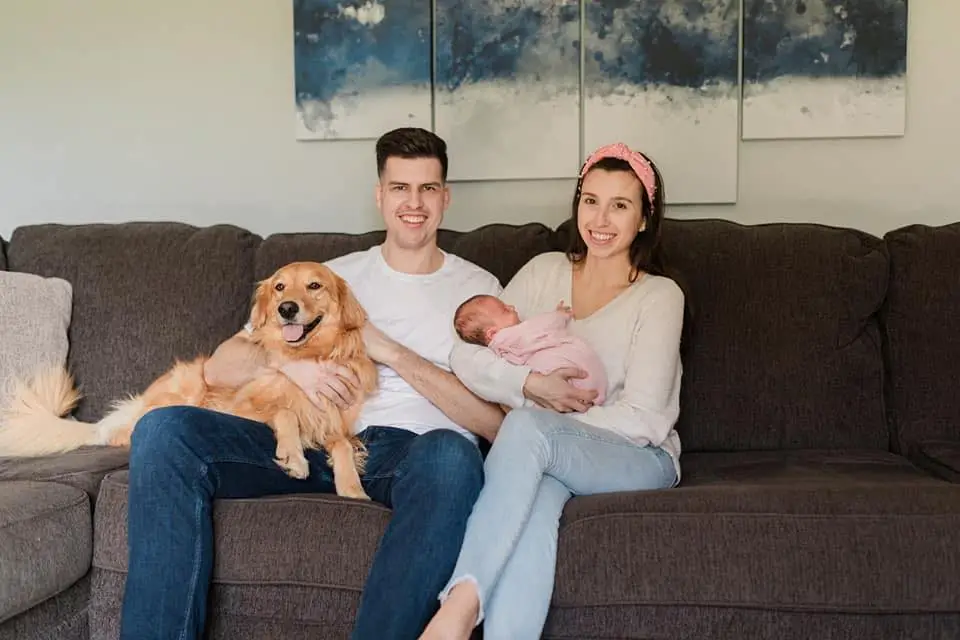Josh Lutz’s Adult Diagnosis of Klinefelter Syndrome
Josh received his diagnosis of XXY when trying to become a father. Initially, while it was a shock, Josh worked to be his best self. He lives with his wife, Lauren, and newborn daughter Maya Florence.
Wrtten By: Carrie Hauskens
Growing Up:
 Growing up without knowing he had XXY, Josh recalls seeing some signs, but at the time, there was nothing to tie them to. For most of his childhood, Josh felt like a regular kid. He enjoyed school, made great friends, and was a decent student. He did struggle to put on weight and was tall and lean, but this never held him back. While he did have some issues with dyslexia, he worked to keep up with his peers. Despite not being a natural reader, Josh found ways to thrive. Sometimes, his reading performance stood out, mainly when taking tests. Josh felt successful at school and enjoyed being a kid.
Growing up without knowing he had XXY, Josh recalls seeing some signs, but at the time, there was nothing to tie them to. For most of his childhood, Josh felt like a regular kid. He enjoyed school, made great friends, and was a decent student. He did struggle to put on weight and was tall and lean, but this never held him back. While he did have some issues with dyslexia, he worked to keep up with his peers. Despite not being a natural reader, Josh found ways to thrive. Sometimes, his reading performance stood out, mainly when taking tests. Josh felt successful at school and enjoyed being a kid.
Josh learned how to blend in with his peers early on. Being an athlete helped, and since he was a hard worker, he put his energy to good use. Josh put in the extra effort at a young age and continued to do so as he grew. His drive for excellence has served him well.
Relationships:
As Josh grew older, he became more aware of the gap between himself and others. When puberty came along, he noticed the gap even more. Then, at 18, his mother died, and his emotional responses became guarded. Anxiety and depression made their way into his life. However, Josh didn’t let his internal struggles show as he continued to portray himself as an outgoing extrovert. It was as though there was a paradox. He communicated well, was the center of attention, all while keeping hidden very heavy emotions while keeping them hidden. People didn’t see him as the guy who has panic attacks. No one talked about emotional intelligence, and it was easy for Josh to brush these feelings aside.
Constantly feeling like he had to be “on,” as Josh grew into an adult, he struggled to navigate parts of his life. He experienced more anxiety and would often flee from it. He was the fun guy and didn’t want to let that go. When things became difficult, Josh would find a way to escape the situation instead of dealing with it head-on. He would find ways to not deal with the problems. His reaction to difficult times became more of an issue the older he got.
Things started to change when Josh met his wife, Lauren. He couldn’t mask his feelings anymore. She wanted to get to know the real him, and he was finally ready to share, but he didn’t know how.
“If you were in a room and shut the light off, chances are in thirty minutes or so, you’d be able to feel around and turn the light back on. Imagine you turned the light off, and fifteen years later, you try to return and turn it on… You’d have no idea where the light was at.” It was time for Josh to stop avoiding his emotions and start the work to let the ones he loved in.
Josh said he would see sad things and knew he should feel sadness, but he didn’t. He never cried or felt anything. He would perceive and understand what was happening but never felt it. Emotionally, there wasn’t a connection. It became evident to Josh that how he responded to the world and the ones he cared for would not be sustainable for a marriage. Josh started therapy and began learning how to open up and deal with his emotions.
Klinefelter Diagnosis:

Once married, Josh and Lauren began trying to conceive. After three years and attempting every natural remedy you could think of, they decided to meet with a fertility doctor. Lauren has Hashimoto’s disease, which is often linked to infertility. The assumption was that Lauren’s autoimmune disease was holding them back from becoming parents. Lauren took some tests, and everything came back looking great. With a positive result on her end, they were in high spirits. And then, they got the call for Josh’s test results. He had no active sperm.
The clinic asked Josh to come back and give another donation, and Josh, thinking it might have been an anomaly, agreed. After the second test, the same result came back: zero sperm. Wondering where to go from here, Josh searched for the best urologists in his area.
Josh underwent more testing, and upon receiving the results, nothing looked out of the ordinary. However, the results did have a blank section, but thinking nothing of it, they headed in to meet with the urologist. Sitting in the office, the doctor reviewed the findings and shared that everything looked normal- except for one part.
“You have Klinefelter Syndrome, and the biggest challenge you face is infertility.” The doctor assumed they knew. The XXY was diagnosed in the test results, but when shared with Josh was left out, hence the blank section. Josh and Lauren arrived at the appointment, unaware. Josh recalled it feeling like watching someone else in a movie. He could hear the doctor talking but didn’t know what was happening. Thoughts raced, and he couldn’t listen to what the doctor was saying. It didn’t feel real.
Fertility Journey:
The urologist explained that while there are options to become parents, it’s unlikely that Josh’s genes would be passed along. Micro-TESE was the best chance for retrieving viable sperm. Even so, Josh’s odds were less than 5%. In September 2022, Josh went forward with the surgery, and to their surprise and delight, about thirty sperm were collected. When paired with Lauren’s eggs, they got fourteen fertilized embryos. Blown away by these results, Josh and Lauren moved forward with an IVF transfer.
The first transfer failed, but the second one succeeded. Josh and Lauren recently welcomed a baby girl, Maya Florence, into their lives, and he couldn’t be happier.
Testosterone:
Josh started taking testosterone with daily topical applications in December 2022. It didn’t have the impact the doctors were hoping for, so working with his urologist, he began taking injections weekly. Having this type of schedule became more manageable and sustainable. Overall, Josh has noticed an improvement in his well-being because of testosterone, both emotionally and physically. Specifically, he has experienced crisper thoughts and no more extended battles with fatigue. “It’s been encouraging to live on an even playing field.”
What Josh Would Tell Others:
 A tattoo resides on Josh’s left forearm. It reads, “Just keep walking”. He can see it daily, a great reminder of how to live. “When we face anything, we want to hunker down and hide. But we need to get back on the horse at some point. Some days, you may take ten steps; others, you might take only one. No matter how many steps you take, every step is a step in victory…The tunnel is dark when you first get the XXY diagnosis. You owe it to yourself and the loved ones around you to keep taking steps forward.” Just keep walking.
A tattoo resides on Josh’s left forearm. It reads, “Just keep walking”. He can see it daily, a great reminder of how to live. “When we face anything, we want to hunker down and hide. But we need to get back on the horse at some point. Some days, you may take ten steps; others, you might take only one. No matter how many steps you take, every step is a step in victory…The tunnel is dark when you first get the XXY diagnosis. You owe it to yourself and the loved ones around you to keep taking steps forward.” Just keep walking.
Josh wants to remind people that others have been on this same journey. Some people are farther along, while some are just arriving. Find people to talk to. Share what you’re dealing with and learn from each other. Josh found community through Living With XXY and met people who gave him perspective and helped him understand his future. Josh emphasized that having someone who understands what you’re feeling is essential. Knowing that someone “gets” you is a must-have when first diagnosed.
When Josh was little, there weren’t many signs of XXY. Nothing was wrong with him. Knowing this, Josh hopes to give peace to a parent with a child with XXY. “You are going to hear and read a lot of terrible things. You might become overwhelmed with how life will be. You’ll think you’ll always have to go the extra mile….But my dad said he wouldn’t have even known there was anything to be concerned about. “
When Josh’s daughter was born, he shared the news online. No one knew he was different from other dads. He told a few of his close friends about his diagnosis, but he takes pride in the fact that he’s not all that different from other dads. “People see me for who I am, and unless I let them in on my journey, they’d never know I have an extra chromosome.”
Josh emphasizes that while sharing his story, others are not required to do the same. “Someone must be ready to share who they are and genuinely embrace themselves. Once you embrace your true self and want to advocate for the community, you can… but you don’t have to.” He says feeling frustrated and not wanting to say anything to anyone is normal. Don’t do it if it doesn’t feel right. “Put yourself in a position to process and give yourself the freedom to process how you need to. That way, when you’re ready to share, you can confidently do so.”
When Josh was first diagnosed, it was the worst pain he’d ever felt. He didn’t want to tell anyone about it. He wasn’t ready to share his story yet. After processing and learning more about what having an extra chromosome meant, Josh opened up about XXY. He shared with a close circle of friends that empathized with him. Even though they have no idea what he’s gone through and what’s to come, they stepped up to support him.
Josh’s perseverance in life is undeniable. Lauren’s support means everything to him, and his daughter’s love makes his life whole. Josh surrounds himself with people who add value to his life. It’s easy to see that he adds value to others as well.




Incredible story and an even more incredible person!
Josh, You know if you had five legs and three arms I’d still love you like I always have. I am just so thankful that you found a doctor who could help. I know God sent you Lauren to be at you side. Your family is so special to me. We are miles apart, but not in prayer. As long as the Lord keep me here I’ll be here for you. Josh, I love you, you are special.
Josh you are a incredibly strong man god bless you and your family.
Thank you for sharing your story, Josh! Very inspiring and hopeful to read as a mom.
I think Josh is the only person I’ve read about that got the Micro TESE surgery and actually found sperm. That’s fantastic!
Brillant story, I have just been diagnosed myself and preparing for the journey ahead. I resonate very much with hiding and pushing away feelings.
Thank you so much for sharing your story 🩵it resonates with me 🫶